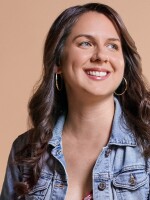STEVE INSKEEP, HOST:
Because it is January 1, some people, maybe a few, might be listening to this with a slight hangover after ringing in the new year.
LEILA FADEL, HOST:
Some people will also use this fresh start to take a break from alcohol. The 31 days of Dry January offer a chance to dry out after the holidays and give people a glimpse of what life looks like without alcohol at all.
INSKEEP: NPR's Life Kit host, Marielle Segarra, is here. Good morning.
MARIELLE SEGARRA, BYLINE: Good morning, Steve.
INSKEEP: And Happy New Year. Why might someone consider participating in Dry January?
SEGARRA: I think alcohol is everywhere in our culture, so it's easy to forget that it's actually not good for us. The World Health Organization says there's no safe amount of alcohol to drink, and that can be true even if you're drinking only a moderate amount - two drinks or less a day for men, one drink or less a day for women. So you'll be giving yourself a break from something that can be very harmful to your health. And if you're not really worried about those health effects long term, you might think about whether alcohol is enriching your life right now. Are you getting hangovers all the time? Are you sleeping poorly after you drink? Are you spending a ton of money on it? Then it might be worth taking a break, seeing what life is like without it.
INSKEEP: You mentioned it's everywhere in the culture. People are often expected to have a drink when they go out. It's how many people socialize.
SEGARRA: Yeah. You know, this comes up in dating a lot. People will be like, you want to meet up for a drink? And I'll tell you - full disclosure - I don't drink anymore. And there's plenty of other stuff you can do together. Like, do an arts and crafts night, a roller-skating, cook together.
INSKEEP: Boring.
SEGARRA: Yeah. No.
INSKEEP: No. I'm sorry.
SEGARRA: This stuff is really - can be really fun. And when you stop drinking, even for a time, it does leave an empty space to figure out what you actually like doing. And that's scary, but it's also exciting, right?
INSKEEP: OK. What's some other advice for people to get through 31 days of this?
SEGARRA: One is if people are giving you a hard time about not drinking, don't feel like you have to apologize or explain. You can simply say, you know, I'm just not drinking right now. I'd love your support. And if you do end up at a bar for a friend's birthday or something, one tip from Casey Davidson, she's a sobriety coach and the host of the "Hello Someday" podcast for sober-curious women.
CASEY DAVIDSON: Don't volunteer to be a designated driver just because you're not drinking. People tend to immediately say, oh, you're doing a no-alcohol challenge. Great. You can drive us. And then you're stuck there till the end with a whole bunch of people who might get drunk, and it's really annoying.
INSKEEP: I love that insight. If you're not the designated driver, you're not stuck there. You can bail out. So if people do this, can they expect, I don't know, some side effects in their lives?
SEGARRA: Yeah. And Casey says if you think you have a physical addiction to alcohol, if you're worried about that, talk to your doctor about how to detox safely. But even if you don't drink a ton, the first couple weeks, you might feel some symptoms of alcohol withdrawal, like interrupted sleep and fatigue.
DAVIDSON: Once you get past that, you start feeling much better. You actually start feeling more joy and more emotionally stable and more excited about life. And sober sleep is fantastic.
SEGARRA: She says you can also kind of prop yourself up by giving yourself sober treats. Like, get a pedicure, order sushi or watch a movie, 'cause alcohol is not the only way to feel good.
INSKEEP: NPR's Marielle Segarra. Cheers.
SEGARRA: Cheers to you, Steve.
INSKEEP: And Happy New Year. If you want more from Life Kit about how to navigate Dry January, they have a special newsletter you can sign up for a npr.org/dryjanuary. Transcript provided by NPR, Copyright NPR.
NPR transcripts are created on a rush deadline by an NPR contractor. This text may not be in its final form and may be updated or revised in the future. Accuracy and availability may vary. The authoritative record of NPR’s programming is the audio record.





